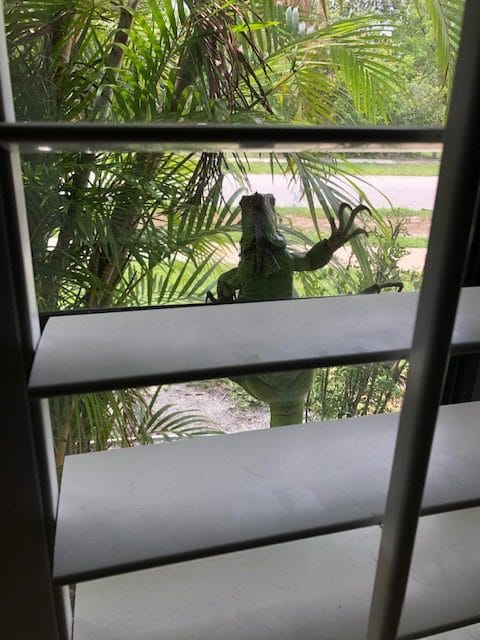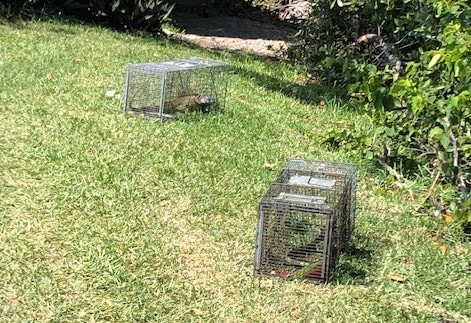Seawalls in South Florida Are Being Destroyed
The green iguana (or Iguana Iguana) is a species that is not native to Florida and are an invasive species in our state. They are known to cause considerable damages to local infrastructure, and this includes sidewalks, swimming pools and seawalls. The green iguana is not protected by the state of Florida, with the exception of anti-cruelty laws with one requirement being humane euthanasia when caught rather than being released into other problematic residential or commercial areas.
The green iguana is a giant lizard with a typically green complexion, although sometimes they can be almost black or brown in color. Some adults can even take on a pink or orange coloration while a hatchling and younger green iguanas usually have a brighter green color to them.
Green Iguana: Characteristics

green iguana climbing on residential home before it was removed by wildlife removal services
Green iguanas have spikes that run down the center of their necks, backs, and the upper portions of their tails, with their tails having dark black rings on them. Mature male iguanas usually have a throat fan or dewlap, as well as heavy jowls, differentiating them from female iguanas by their larger size. A large throat fan can make a male iguana appear bigger, which aids in repelling rivals or act as a warning to predators. The dewlap also helps the iguana regulate body heat as well as appear more attractive for mating with females.
A male green iguana can grow to lengths of over five feet and can weigh as much as seventeen pounds. Female iguanas can also be as long as five feet, but they do not usually exceed seven pounds. A female green iguana usually reaches reproductive maturity at two to four years old. Green iguanas will often mate from October and through November in their native ranges. Nesting occurs on beaches, riverbanks, and other suitable sandy areas. Female iguanas will dig egg chambers that can contain almost 80 feet of interconnected tunnels with multiple entrances and can lay anywhere from fourteen to even seventy-six eggs. In the wild, green iguanas can live up to ten years old, but they are known to reach almost twenty years of age in captivity.
The green iguana can be found living in shrubs, the ground, under your roof tiles, or even in trees in a variety of different habitats ranging from suburban developments, small towns, agricultural areas, or even urban environments. They are excellent at swimming and can tolerate both salt and freshwater, being able to submerge themselves for up to four hours at one time.
How do Iguanas Damage Seawalls
An unchecked green iguana population can cause damages to commercial and residential landscape vegetation; they are often considered a nuisance by property owners. Iguanas have an attraction to trees with large foliage, most non-citrus fruits, or flowers, and will eat almost any vegetable. Some green iguanas can even damage infrastructure by digging their burrows, which will erode and collapse sidewalks, seawalls, berms, carnal bangs, and foundations. Green iguanas may also leave their droppings on seawalls, porches, pool platforms, decks, moored boats, docks, and even inside swimming pools. Similar to other reptiles, green iguanas can also transmit bacterium salmonella to humans through contact with surfaces or water that has been contaminated by their feces.
What can I do to deter green iguanas from entering my property?
If you are having an iguana frequent your area, you can take precautions to deter the reptile from doing so, such as modifying the habitat around your property or harassing the animal humanely.
Some examples of mostly ineffective iguana deterrents and habitat modifications include:
- Removing plants that would attract iguanas to your yard
- Discourage burrowing by filling in holes
- Spray the iguana with a water gun or hose as a deterrent
Wildlife Control for Green Iguanas
After attempting a few of the above deterrents without success, will result in flowers and other plants to be destroyed. Youll find yourself wondering – is it time to call a professional iguana removal company? Although the green iguana does not usually attack humans, they are known to be a territorial and aggressive reptile. They have long, strong spiny tails which could prove dangerous for pets or humans if approached.
For most situations, it would be best to contact the iguana removal specialist in your area to resolve your iguana problem efficiently.
Call (561) 212-9255 to speak with Wildlife Removal Services today for a no-obligation estimate on reliable iguana exclusion and removal services for your home or business. We are backed by over 20 years of results-driven experience removing iguanas in Palm Beach County and Broward County. We get the job done and get it done right.

